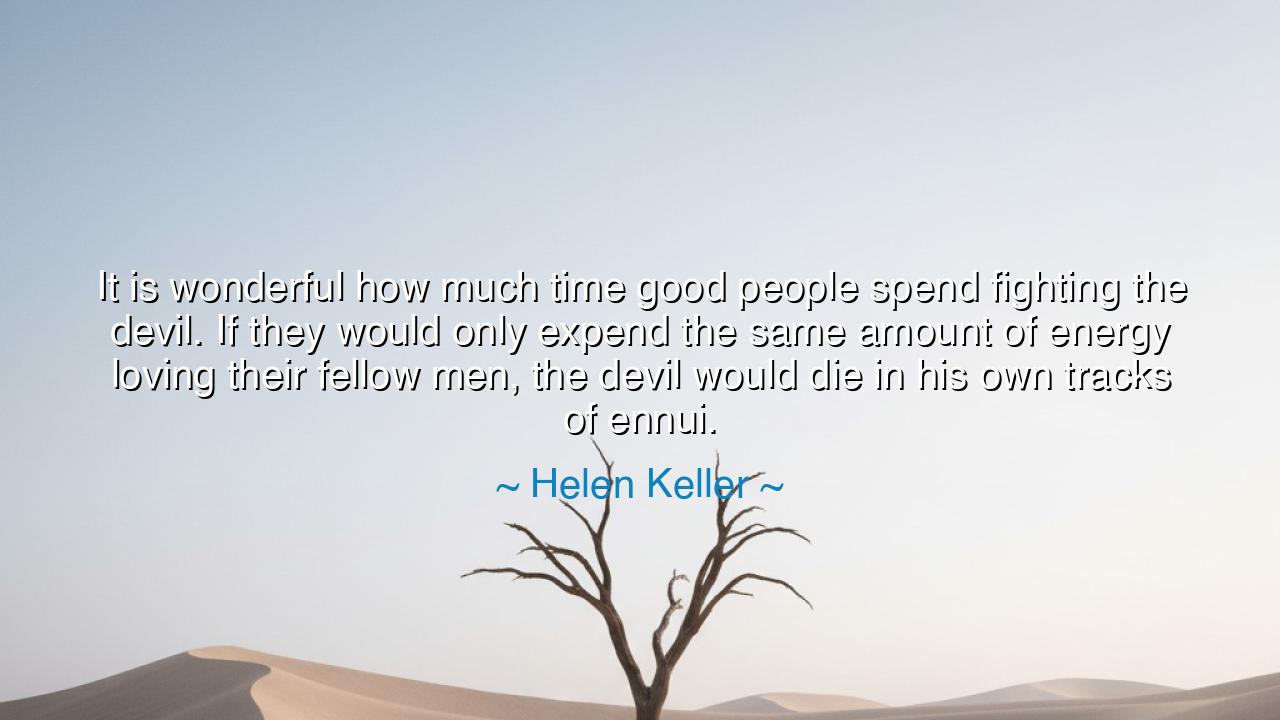
It is wonderful how much time good people spend fighting the
It is wonderful how much time good people spend fighting the devil. If they would only expend the same amount of energy loving their fellow men, the devil would die in his own tracks of ennui.






“It is wonderful how much time good people spend fighting the devil. If they would only expend the same amount of energy loving their fellow men, the devil would die in his own tracks of ennui.” — So spoke Helen Keller, the luminous soul who, though blind and deaf, saw deeper into truth than most who see and hear. In this radiant saying, she unmasks the futility of waging war against evil through hatred, fear, or condemnation. She teaches that the truest victory over darkness is not through combat, but through love, for love alone starves evil of its sustenance. The devil, she says — whether a symbol of malice, cruelty, or ignorance — cannot survive in a world overflowing with compassion. It would perish not by force, but by boredom, by the stillness of having no one left to corrupt.
Helen Keller’s life was itself a hymn to this wisdom. Born into silence and darkness, she could have grown bitter, railing against the cruelty of fate. Yet through the guidance of her teacher Anne Sullivan, she discovered light within herself — the light of patience, courage, and love. From that light came not hatred of suffering, but reverence for life. Her triumph over isolation was not an act of vengeance against her limitations, but an act of faith in human possibility. Thus, when Keller speaks of “good people fighting the devil,” she speaks from experience — from having learned that the surest way to defeat despair is to outshine it with kindness.
The meaning of her words reaches into every heart that seeks righteousness. Many people, eager to do good, exhaust themselves warring against what they call evil. They denounce, accuse, and condemn, believing that by naming the devil they will drive him away. Yet in their fervor, they often become mirrors of the very cruelty they despise. The more they fight the darkness, the more they stare into it — and so the darkness stares back. Keller’s insight is a revelation: evil cannot be destroyed by opposition, only by obsolescence. When the heart is full of love, hatred withers for lack of breath. When mercy becomes our law, vengeance dies of hunger.
Consider the life of Mahatma Gandhi, whose revolution was not of swords but of spirit. He faced the mighty British Empire not with rage, but with unwavering love — for his oppressors as much as for his own people. His philosophy of ahimsa, or non-violence, did not merely resist evil; it rendered evil powerless, deprived of its fuel. Where others would have cursed, he forgave; where others sought conquest, he sought conversion of the heart. In doing so, Gandhi embodied the truth of Keller’s words — that to love one’s enemies is to dissolve their enmity. Had the world more such warriors of compassion, the devil himself would grow weary and vanish into the void he came from.
Keller’s warning also calls upon us to examine the subtle pride of the righteous. Those who see themselves as defenders of purity often fall prey to self-righteousness, mistaking judgment for justice. But love, she reminds us, is the higher path. It requires humility, patience, and tenderness — qualities the ego resists. To love one’s fellow beings, even the flawed and the cruel, demands courage greater than any battle against a visible foe. It means to meet hatred with understanding, to answer fear with hope, to respond to cruelty not with weakness, but with a strength so serene that evil simply finds no foothold.
Her use of the word “ennui” — that is, boredom — is no accident. For Keller, evil thrives on reaction, on conflict, on the heat of battle. When we fight it with fury, we feed it with attention. But when we respond with peace, with compassion, with the creative energy of love, evil becomes irrelevant, lifeless, and dull. Imagine a world where people spend their days not condemning their enemies, but lifting the fallen, feeding the hungry, teaching the ignorant, healing the wounded. In such a world, the devil would indeed “die in his own tracks,” starved of the fear and division that sustain him.
Therefore, dear listener, take this teaching to heart: do not waste your strength hating evil — spend it loving good. When you encounter cruelty, do not become cruel in your opposition to it. When you see darkness, light a candle instead of cursing the night. The greatest warriors of history — from the saints to the poets to the liberators of the soul — all knew this truth: that love is not weakness, but the highest form of power. It does not fight evil on its terms; it transcends it entirely.
And so, the lesson of Helen Keller endures through the ages: to love is to disarm the devil. The battlefield of the soul is not won through anger, but through understanding. Do not let your days be consumed by the struggle against shadows. Instead, pour your heart into the labor of kindness, generosity, and joy. For when love reigns in every heart, evil will not need to be slain — it will simply wither, forgotten, unloved, and undone.






AAdministratorAdministrator
Welcome, honored guests. Please leave a comment, we will respond soon